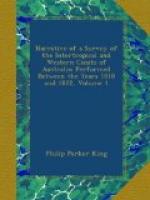Annonaceae : Tasmania Australis. Brown. : Spice Bark, or Tasman’s Bark : 20 to 25 : 4 to 6 inches.
January 21 to 24.
On the 24th, having nearly expended our time and having ascertained the forms of the shoals and completed the soundings of the channels in the entrance of this truly remarkable harbour, we left Pine Cove on our return: having a favourable wind we ran through Kelly’s Channel and anchored in Outer Bay, between Entrance Island and the bar, in order to complete our water at the stream that runs over the beach, and to obtain some sights on the Island for the rates of the chronometers. On anchoring, several natives were seen on the beach calling to us, but the wind was too fresh to allow of our communicating with them that day.
January 25.
But early the next morning, our boat being sent on shore with our empty baricas and some casks for water, our party was amicably received by a tribe of natives, consisting of six men and four old women; they came forward unarmed, but as we afterwards found, their spears were concealed close at hand.
Some presents were distributed amongst them, of which the most valuable, in their estimation, were empty wine-bottles, which they called moke, this word was however used by them for water also, so that it was doubtful whether the word meant the article itself or the vessel that contained it. Our familiarity increased so rapidly that by the time that we had dug two wells to receive the water which was flowing over the beach, they had become very inquisitive, and made no hesitation in searching our pockets, and asking for everything they saw. One of the men, upon being detected in the act of pilfering a piece of white paper from Mr. Cunningham’s specimen box, immediately dropped it, and drew back, much alarmed for fear of punishment, and also ashamed of having been discovered; but after a few angry looks from us, the paper was given to him, and peace was soon restored.
Our dog, being a subject of much alarm, was fastened to the stern of our boat; a circumstance which prevented their curiosity from extending itself in that direction, and thus our arms were kept in convenient readiness without their knowledge.
As soon as our boats were loaded and we had embarked the natives retired to a bush; behind which we observed the heads of several children and young women. As many as sixteen were counted; so that this tribe, or family, might be composed of from twenty-five to thirty persons, of which we only saw six who were grown men.
They were stouter and better proportioned than the natives of New South Wales; and, unlike them, their hair was woolly: the only covering in use amongst them was a kangaroo-skin, which they wore as a cloak over their shoulders. On the return of the boat after breakfast, they did not make their appearance, and it turned out that they had crossed over to the sea-side in search of shellfish; but on the boats going in the afternoon for a third turn of water, two natives whom we had seen in the morning came towards us: one of them submitted his head to the effects of Mr. Cunningham’s scissors, which had, much to their gratification and delight, clipped the hair and beard of one of our morning visitors: a slight prick on the nose was not ill-naturedly taken by him, and excited a laugh from his companion.




